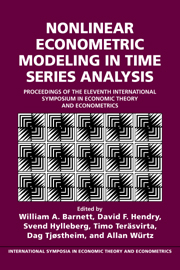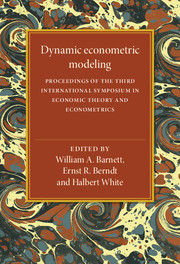Social Choice, Welfare, and Ethics
This book presents an overview of recent developments in social choice theory and welfare economics, drawn from the proceedings of the eighth conference in the International Symposia in Economic Theory and Econometrics series under the general editorship of William Barnett. The volume is divided into four parts, each exploring broad themes in social choice theory and welfare economics: an overview of the subject's historical development, a discussion of the ethical aspects of social choice, a study of the algebraic and combinatorial aspects of social choice theory, and an application of mathematic theory to several case studies.
- Investigation of a key area in economic theory
- Was the first collection to appear drawing on work of the new Social Choice and Welfare Society
- Well-integrated collection of rigorous analyses from leading North American and European scholars
Product details
February 1995Hardback
9780521443401
432 pages
235 × 159 × 29 mm
0.754kg
28 b/w illus. 27 tables
Available
Table of Contents
- Introduction and overview Hervé Moulin, Maurice Salles and Norman J. Schofield
- Part I. Historical Aspects of Social Choice:
- 1. The first golden age of social choice, 1784–1803 Ian McLean
- Part II. Ethical Aspects of Social Choice:
- 2. The requisites of equal opportunity Marc Fleurbaey
- 3. Social choice of individual and group rights Peter J. Hammond
- 4. Population monotonic allocation rules William Thomson
- Part III. Algebraic and Combinatorial Aspects of Social Choice:
- 5. Condorcet efficiency and social homogeneity William Gehrlein
- 6. Latticial theory of consensus Bernard Leclerc and Bernard Monjardet
- Part IV. Geometric Aspects of Social Choice:
- 7. Arrow theorems in economic environments James Redekop
- 8. Inner consistency or not inner consistency: a reformulation in the answer Donald G. Saari
- 9. Existence of a smooth social function Norman J. Schofield
- 10. Dynamical convergence in the Euclidean spatial model Craig A. Tovey
- Part IV. Social Choice and Co-operative Games:
- 11. Incentives in market games with asymmetric information Beth Allen
- 12. A note on implementation and strong dominance Tilman Börgers
- 13. Coalition-proof communication equilibria Ezra Einy and Bezalel Peleg
- 14. Stability of coalition structures and the principle of optimal partitioning Michel Le Breton and Shlomo Weber
- 15. The hold-out game: an experimental study of an infinitely repeated game with two-sided complete information Richard D. McKelvey and Thomas R. Palfrey
- Part IV. Other Applications:
- 16. Exact Aggregation under Risk William A. Barnett
- 17. The stochastic dominance ordering of income distributions over time: the discounted sum of the expected utilities of incomes Thierry Karcher, Patrick Moyes and Alain Trannoy
- Appendix.









